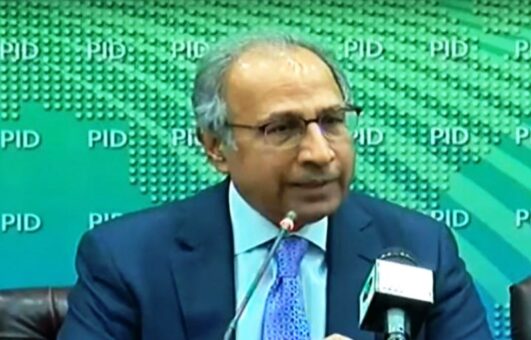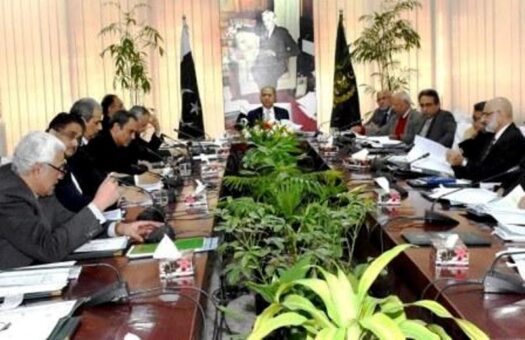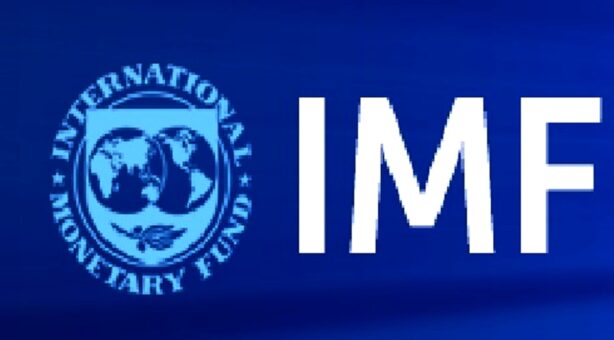ISLAMABAD: The second meeting of think tank on Saturday discussed the viability of reducing General Sales Tax (GST) from existing 17 percent to five percent on consumer goods to kick start consumer spending.
Advisor to the Prime Minister on Finance and Revenue Dr. Abdul Hafeez Sheikh chaired the 2nd meeting of the Thinktank, recently constituted under the directions of Prime Minister, to deliberate on the Covid-19 related economic downturn and mitigation of ensuing risks.
The forum discussed the need and scope for bailout package for large businesses and exporters apart from gauging the viability of reduction of GST on consumer goods, from 17 percent to 5 percent, to kick-start consumer spending for next two years.
The constraints of FBR amid high revenue targets in a shrinking economy were highlighted by Finance Secretary. Decision in this regard would be made after detailed consultations.
The forum has been mandated to provide platform for collective thinking on the emerging situation resulting from the Covid-19 related medical crisis and its spillover to economy.
Its other members include Shaukat Tareen, Dr. Ishrat Husain, Dr. Ijaz Nabi, Sultan Ali Allana, Arif Habib, Dr. Waqar Masood. Advisor to PM on Commerce and Finance Secretary are also part of it.
After extensive deliberations on emerging themes, the forum identified key areas for policy interventions, including monetary affairs and banking sector, fiscal matters and public finances, social safety nets, SMEs and large businesses, commodity prices, public health challenges and role of private sector and NGOs.
Advisor to PM on Finance apprised the forum about developments at G-20 forum regarding debt relief package. There is potential for USD 1.8 billion debt deferment for one year under this, whereas proceeds worth USD 1.4 billion under IMF have already been received.
Participants highlighted the need for further downward revision in policy rate coupled with passing on the benefits of slashed oil prices in global market to public. The focus of the deliberations remained on strengthening of aggregate demand and supply of the economy, with emphasis on lower income groups and small firms.
Need for further liquidity for banks was discussed as strong and vibrant banking sector is essential to boost economy under such strong recessionary headwinds. Ways to further encourage remittances, agriculture financing and timely lifting of crops and vegetables from small farmers were analyzed.
The progress of ongoing cash disbursements under Ehsas program were shared. The need for gathering reliable data on recently laid-off works and timely cash transfers to the most vulnerable were emphasized.
Economists within the Think-tank stressed for the need of designing PSDP to facilitate labor intensive projects apart form crafting robust agriculture financing plans. The need for public private partnerships was elaborated to create fiscal space within public sector through these off-balance sheet financing arrangements which encourage private sector participation in public sector initiatives.
Professionals within group stressed for the need of oil price hedging, power sector debt securitization and creation of fiscal space through rescheduling of foreign and domestic debts. The need for designing lending programs for housing sector participants came under consideration including facilitation of end-users. The massive scope for mortgage backed financing in Pakistan was also highlighted.
Advisor to PM on Finance and Revenue took lead in picking most urgent themes for proper policy deliberations and decisions.
He shared that Prime Minster of Pakistan may participate in the next session to give boost to the work of this Forum which has been constituted to provide intellectual and professional insights to the Ministry in designing and implementing incentives for economy in pragmatic fashion.
Advisor decided that interventions with highest, medium and low impacts would be sorted out and aligned on the basis of short, medium and long term time horizons so that most essential tasks are pushed on priority basis, with proper funding and execution arrangements.
It was also decided that international think-tanks will be engaged for cross-leaning for select policy making players in Pakistan so that robust interventions are designed to bring relief to economy and most deserving segments of public.







